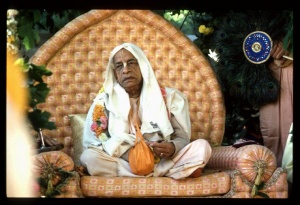CC Madhya 20.158 (1975): Difference between revisions
(Vanibot #0027: CCMirror - Mirror CC's 1996 edition to form a basis for 1975) |
(Vanibot #0020: VersionCompareLinker - added a link to the Version Compare feature) |
||
| Line 2: | Line 2: | ||
<div style="float:left">'''[[Sri Caitanya-caritamrta (1975)|Śrī Caitanya-caritāmṛta (1975)]] - [[CC Madhya (1975)|Madhya-līlā]] - [[CC Madhya 20 (1975)|Chapter 20: Lord Śrī Caitanya Mahāprabhu Instructs Sanātana Gosvāmī in the Science of the Absolute Truth]]'''</div> | <div style="float:left">'''[[Sri Caitanya-caritamrta (1975)|Śrī Caitanya-caritāmṛta (1975)]] - [[CC Madhya (1975)|Madhya-līlā]] - [[CC Madhya 20 (1975)|Chapter 20: Lord Śrī Caitanya Mahāprabhu Instructs Sanātana Gosvāmī in the Science of the Absolute Truth]]'''</div> | ||
<div style="float:right">[[File:Go-previous.png|link=CC Madhya 20.157 (1975)|Madhya-līlā 20.157]] '''[[CC Madhya 20.157 (1975)|Madhya-līlā 20.157]] - [[CC Madhya 20.159 (1975)|Madhya-līlā 20.159]]''' [[File:Go-next.png|link=CC Madhya 20.159 (1975)|Madhya-līlā 20.159]]</div> | <div style="float:right">[[File:Go-previous.png|link=CC Madhya 20.157 (1975)|Madhya-līlā 20.157]] '''[[CC Madhya 20.157 (1975)|Madhya-līlā 20.157]] - [[CC Madhya 20.159 (1975)|Madhya-līlā 20.159]]''' [[File:Go-next.png|link=CC Madhya 20.159 (1975)|Madhya-līlā 20.159]]</div> | ||
{{CompareVersions|CC|Madhya 20.158|CC 1975|CC 1996}} | |||
{{RandomImage}} | {{RandomImage}} | ||
==== TEXT 158 ==== | ==== TEXT 158 ==== | ||
| Line 27: | Line 26: | ||
<div class="translation"> | <div class="translation"> | ||
" 'Learned transcendentalists who know the Absolute Truth call this nondual substance Brahman, Paramātmā or Bhagavān.' | |||
</div> | </div> | ||
| Line 34: | Line 33: | ||
<div class="purport"> | <div class="purport"> | ||
This is a quotation from Śrīmad-Bhāgavatam ([[SB 1.2.11]]). | This is a quotation from Śrīmad-Bhāgavatam ([[SB 1.2.11|1.2.11]]). For an explanation, see also Ādi-līlā, Chapter Two, verse 11. | ||
Those who are interested in the impersonal Brahman effulgence which is not different from the Supreme Personality of Godhead, can attain that goal by speculative knowledge. Those who are interested in practicing mystic yoga can attain the localized aspect of Paramātmā. As stated in Bhagavad-gītā, īśvaraḥ sarva-bhūtānāṁ hṛd-deśe 'rjuna tiṣṭhati: the Supreme Personality of Godhead is situated within the heart as Paramātmā. He witnesses the activities of the living entities and gives them permission to act. | |||
</div> | </div> | ||
Latest revision as of 12:45, 27 January 2020

A.C. Bhaktivedanta Swami Prabhupada
TEXT 158
- vadanti tat tattva-vidas
- tattvaṁ yaj jñānam advayam
- brahmeti paramātmeti
- bhagavān iti śabdyate
SYNONYMS
vadanti—they say; tat—that; tattva-vidaḥ—learned souls; tattvam—the Absolute Truth; yat—which; jñānam—knowledge; advayam—nondual; brahma—Brahman; iti—thus; paramātmā—Paramātmā; iti—thus; bhagavān—Bhagavān; iti—thus; śabdyate—is known.
TRANSLATION
" 'Learned transcendentalists who know the Absolute Truth call this nondual substance Brahman, Paramātmā or Bhagavān.'
PURPORT
This is a quotation from Śrīmad-Bhāgavatam (1.2.11). For an explanation, see also Ādi-līlā, Chapter Two, verse 11.
Those who are interested in the impersonal Brahman effulgence which is not different from the Supreme Personality of Godhead, can attain that goal by speculative knowledge. Those who are interested in practicing mystic yoga can attain the localized aspect of Paramātmā. As stated in Bhagavad-gītā, īśvaraḥ sarva-bhūtānāṁ hṛd-deśe 'rjuna tiṣṭhati: the Supreme Personality of Godhead is situated within the heart as Paramātmā. He witnesses the activities of the living entities and gives them permission to act.